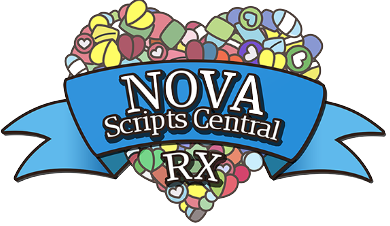By Tiffany Lee 2018 PharmD Candidate
8 out of 10 prescriptions filled in the U.S. today are for generic drugs, but many patients still have questions about generic drugs. Here’s a quick rundown on brand versus generic drugs and why we at NOVA ScriptsCentral mainly dispense generic drugs.
Brand drugs
A brand name drug has to go through many years of research, testing, and clinical trials before it can be approved and sold to the public. In part due to the amount of money that is needed to go into research and development of a brand name drug, the company that produces the drug first is given a patent, which allows only that company alone to make and sell the drug for a certain number of years. However, once this patent expires, other manufacturers can copy and sell generic versions of the medication once the FDA has approved them.
Generic drugs
Generic drugs are effectively a copy of brand name drugs. The FDA requires generic drugs to have the same active ingredient, strength, dosage form, and route of administration as the brand name drug. However, generic drugs differ in appearance because of the patents that brand name drugs hold. So, generic manufacturers create generic drugs with different colors, shapes, sizes, or flavors, but the performance still must match that of the brand name drug before they can be sold to the public. As such, a generic drug is as effective as a brand name drug, and the FDA also monitors them just as strictly as brand name drugs.
So why generic drugs?
Generic drugs can be sold at lower prices because first, generic manufacturers do not need to put time and money into researching and developing the drug from scratch, which is extremely costly. They also do not need to repeat the costly clinical trials that new drugs need to go through to prove their safety and effectiveness. As the brand name manufacturer has already proven the drug’s safety and effectiveness, generic manufacturers simply need to demonstrate that their generic version performs the same as the brand name drug, and that they meet the same manufacturing, packaging, and testing site quality standards as the brand name drugs. Second, in addition to not needing to run expensive clinical trials, generic manufacturers do not pay for advertising, marketing, and promotion. Lastly, as lots of companies are allowed to produce the generic version of the drug, the competition helps decrease the price of the drug even further. Combining all these factors, the average cost of a generic drug is 80-85% less than its brand name counterpart.
As a result, at NOVA ScriptsCentral we dispense many generic drugs because they are more cost efficient and work just as well as brand name drugs. If you have any questions regarding your medications, talk with your health care provider or pharmacist and see what they can do to help you.
Resources
“Facts About Generic Drugs.” Food and Drug Administration, 19 Sept. 2012. Web. 10 June 2015.
Hupila, Matthew, and Dorothy Smith. “5 Common Questions About Generic Drugs.” Consumer Health Information Corporation, 2008. Web. 10 June 2015.
“Generic Drugs: Questions and Answers.” Food and Drug Administration, 7 Jan. 2015. Web. 10 June 2015.
Greene, Jeremy A., and Aaron S. Kesselheim. “Why Do the Same Drugs Look Different? Pills, Trade Dress, and Public Health.” New England Journal of Medicine N Engl J Med (2011): 83-89. Print.

